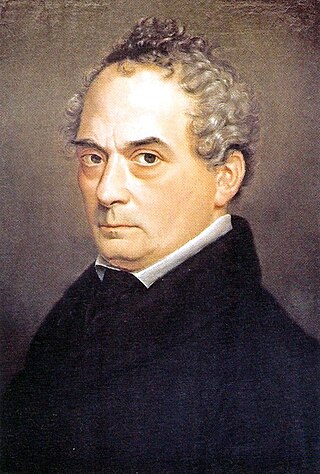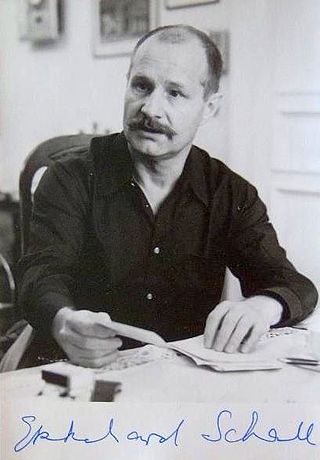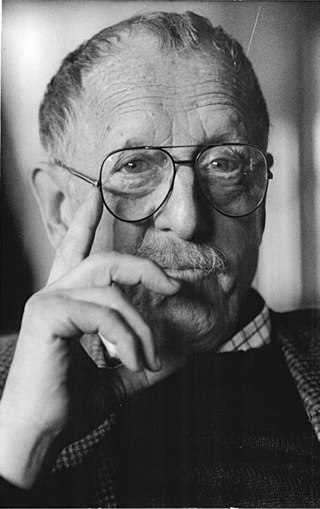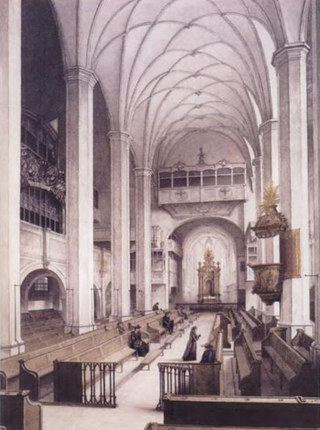| Geschichte vom armen Hassan | |
|---|---|
| Directed by | Gerhard Klein |
Release date |
|
| Country | East Germany |
| Language | German |
Geschichte vom armen Hassan is an East German film. It was released in 1958.

Clemens Wenzeslaus Brentano was a German poet and novelist, and a major figure of German Romanticism. He was the uncle, via his brother Christian, of Franz and Lujo Brentano.

Der Struwwelpeter is an 1845 German children's book written and illustrated by Heinrich Hoffmann. It comprises ten illustrated and rhymed stories, mostly about children. Each cautionary tale has a clear moral lesson that demonstrates the disastrous consequences of misbehavior in an exaggerated way. The title of the first story provides the title of the whole book. Der Struwwelpeter is one of the earliest books for children that combines visual and verbal narratives in a book format, and is considered a precursor to comic books.

Jewish emancipation was the process in various nations in Europe of eliminating Jewish disabilities, e.g. Jewish quotas, to which European Jews were then subject, and the recognition of Jews as entitled to equality and citizenship rights. It included efforts within the community to integrate into their societies as citizens. It occurred gradually between the late 18th century and the early 20th century.

The Mushki were an Iron Age people of Anatolia who appear in sources from Assyria but not from the Hittites. Several authors have connected them with the Moschoi (Μόσχοι) of Greek sources and the Georgian tribe of the Meskhi. Josephus Flavius identified the Moschoi with the Biblical Meshech. Two different groups are called Muški in Assyrian sources, one from the 12th to the 9th centuries BC near the confluence of the Arsanias and the Euphrates and the other from the 8th to the 7th centuries BC in Cappadocia and Cilicia. Assyrian sources clearly identify the Western Mushki with the Phrygians, but later Greek sources then distinguish between the Phrygians and the Moschoi.

Ekkehard Schall was a German stage and screen actor/director.

The phantom time conspiracy theory is a pseudohistorical conspiracy theory first asserted by Heribert Illig in 1991. It hypothesizes a conspiracy by the Holy Roman Emperor Otto III, Pope Sylvester II, and possibly the Byzantine Emperor Constantine VII, to fabricate the Anno Domini dating system retroactively, in order to place them at the special year of AD 1000, and to rewrite history to legitimize Otto's claim to the Holy Roman Empire. Illig believed that this was achieved through the alteration, misrepresentation and forgery of documentary and physical evidence. According to this scenario, the entire Carolingian period, including the figure of Charlemagne, is a fabrication, with a "phantom time" of 297 years added to the Early Middle Ages.

Ernst Wiechert was a German teacher, poet and writer.
Heinz Schubert was a German actor, drama teacher and photographer, best known for playing the role of Alfred Tetzlaff in the German television sitcom Ein Herz und eine Seele.

Erwin Geschonneck was a German actor. His biggest success occurred in the German Democratic Republic, where he was considered one of the most famous actors of the time.
Geschichte des osmanischen Reiches is a work by the Austrian orientalist historian Joseph von Hammer-Purgstall. It was written in 10 volumes between 1827 and 1835. The result of 30 years of work, it became the standard reference on the subject.
Die Geschichte vom Kleinen Muck is a 1953 feature film directed by Wolfgang Staudte, adapted from the 19th century fairy tale, Little Muck, written by Wilhelm Hauff. It was the most successful film in East Germany.

The War of the Lüneburg Succession was a conflict over the succession to the Principality of Lüneburg that broke out in 1370 in north Germany and lasted, with interruptions, for 18 years. After William II of Lüneburg died without male heirs in 1369, the "Older House of Lüneburg" was extinguished. According to the inheritance rules of the House of Welf to which William belonged, the Duke of Brunswick, Magnus II Torquatus, was entitled to succeed. However, Charles IV ruled that this Imperial Fief should be returned to the Empire and enfeoffed Albert of Saxe-Wittenberg and his uncle, Wenceslas with the Principality, thereby triggering the war.
The Treaty of Pyzdry was signed on 2 November 1390 between Władysław II Jagiełło, king of Poland and Wartislaw VII of Pomerania-Stolp. The treaty, signed in Pyzdry, contained an oath of vassalage of Wartislaw to Jagiełło, the obligation to support the latter in the Polish-Teutonic War, and mutual trade alleviations for Pomeranian and Polish merchants. Wartislaw VII, who with his brothers was allied with the Teutonic Order before, received the Polish castellany of Nakło and probably some adjacent areas as a fief.

Nicolaus Ferdinand Haller was a jurist, a senator and the First Mayor of Hamburg, and the head of state from 1863 to 1864; 1866 to 1867; 1870 to 1873.

Weilheim in Oberbayern is a town in Germany, the capital of the district Weilheim-Schongau in the south of Bavaria. Weilheim has an old city-wall, historic houses and a museum.

Johann Sebastian Bach composed the church cantata Ach Herr, mich armen Sünder, BWV 135 in Leipzig for the third Sunday after Trinity and first performed it on 25 June 1724. It is the fourth chorale cantata from his second annual cycle, and is based on the hymn by Cyriakus Schneegass.
The Poor Sisters of St. Francis, also known as the Aachener Franziskanerinnen, are a religious congregation founded by the Blessed Mary Frances Schervier in 1845 in Germany. Their distinguishing emblem is a red cross with the Instruments of the Passion on it, which was originally embroidered on the scapular of their religious habits.

The County of Moers was a historical princely territory on the left bank of the Lower Rhine that included the towns of Moers and Krefeld as well as the surrounding villages and regions.
Ronivaldo Bernardo Sales is a Brazilian professional footballer who plays as a forward for Blau-Weiß Linz. Previously, he has played for Austria Lustenau, Kapfenberger SV, Arapongas, and lastly Taubate. Besides Brasil, he has played in Austria.

Friedrich Gustav von der Leyen was a German philologist who specialized in Germanic studies.